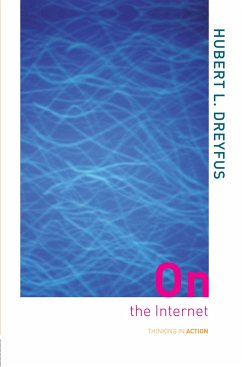Drawing on a diverse array of thinkers from Plato to Kierkegaard, On the Internet is one of the first books to bring philosophical insight to the debate on how far the internet can and cannot take us.
Dreyfus shows us the roots of the disembodied, free floating web surfer in Descartes' separation of mind and body, and how Kierkegaard's insights into the birth of the modern reading public anticipate the news-hungry, but disinterested risk avoiding internet junkie. Drawing on recent studies of the isolation experienced by many internet users, Dreyfus shows how the internet's privatisation of experience ignores essential human capacities such as trust, moods, risk, shared local concerns and commitment. On the Internet is essential reading for anyone on line and all those interested in our place in the e-revolution.
Dreyfus shows us the roots of the disembodied, free floating web surfer in Descartes' separation of mind and body, and how Kierkegaard's insights into the birth of the modern reading public anticipate the news-hungry, but disinterested risk avoiding internet junkie. Drawing on recent studies of the isolation experienced by many internet users, Dreyfus shows how the internet's privatisation of experience ignores essential human capacities such as trust, moods, risk, shared local concerns and commitment. On the Internet is essential reading for anyone on line and all those interested in our place in the e-revolution.
'Hubert Dreyfus' new book offering a philosophy of the Internet is part of a welcome new series by Routledge in which prominent intellectuals apply philosophical reflection to topical issues in short pamphlet-like books. The purpose of the series is to give philosophers a forum where they can enact the role of public intellectuals, and judging by this book by Dreyfus, the result can be an interesting and provocative argument addressed to general readers.' - Ronald Beiner, Bulletin of Science, Technology and Society (Can)
'A sharp and stimulating discussion of the promises of the Intenet. Going beyond the hype of the cybercrowd, Dreyfus a celebrated writer on philosophy and technology, asks whether the Internet can really bring humanity to a new level of community and solve the problems of mass education. Dreyfus' critique of huper learning provides much food for thought and raises the level of the discussions amongst concerned educators and technologists.' - First Monday
'If Lord Russell [a Victorian politicia] had lived to play with the Internet, he'd have produced a widely ranging yet highly focussed, philosophical thought bank like this. Excellent!' - British Journal of Educational Technology
'A well-crafted polemic... we need more teachers like Dreyfus himself, integrating the web into courses that are still deeply human.' Adam Morton, Times Literary Supplement
'A sharp and stimulating discussion of the promises of the Intenet. Going beyond the hype of the cybercrowd, Dreyfus a celebrated writer on philosophy and technology, asks whether the Internet can really bring humanity to a new level of community and solve the problems of mass education. Dreyfus' critique of huper learning provides much food for thought and raises the level of the discussions amongst concerned educators and technologists.' - First Monday
'If Lord Russell [a Victorian politicia] had lived to play with the Internet, he'd have produced a widely ranging yet highly focussed, philosophical thought bank like this. Excellent!' - British Journal of Educational Technology
'A well-crafted polemic... we need more teachers like Dreyfus himself, integrating the web into courses that are still deeply human.' Adam Morton, Times Literary Supplement
'Hubert Dreyfus' new book offering a philosophy of the Internet is part of a welcome new series by Routledge in which prominent intellectuals apply philosophical reflection to topical issues in short pamphlet-like books. The purpose of the series is to give philosophers a forum where they can enact the role of public intellectuals, and judging by this book by Dreyfus, the result can be an interesting and provocative argument addressed to general readers.' - Ronald Beiner, Bulletin of Science, Technology and Society (Can)
'A sharp and stimulating discussion of the promises of the Intenet. Going beyond the hype of the cybercrowd, Dreyfus a celebrated writer on philosophy and technology, asks whether the Internet can really bring humanity to a new level of community and solve the problems of mass education. Dreyfus' critique of huper learning provides much food for thought and raises the level of the discussions amongst concerned educators and technologists.' - First Monday
'If Lord Russell [a Victorian politicia] had lived to play with the Internet, he'd have produced a widely ranging yet highly focussed, philosophical thought bank like this. Excellent!' - British Journal of Educational Technology
'A well-crafted polemic... we need more teachers like Dreyfus himself, integrating the web into courses that are still deeply human.' Adam Morton, Times Literary Supplement
'A sharp and stimulating discussion of the promises of the Intenet. Going beyond the hype of the cybercrowd, Dreyfus a celebrated writer on philosophy and technology, asks whether the Internet can really bring humanity to a new level of community and solve the problems of mass education. Dreyfus' critique of huper learning provides much food for thought and raises the level of the discussions amongst concerned educators and technologists.' - First Monday
'If Lord Russell [a Victorian politicia] had lived to play with the Internet, he'd have produced a widely ranging yet highly focussed, philosophical thought bank like this. Excellent!' - British Journal of Educational Technology
'A well-crafted polemic... we need more teachers like Dreyfus himself, integrating the web into courses that are still deeply human.' Adam Morton, Times Literary Supplement








